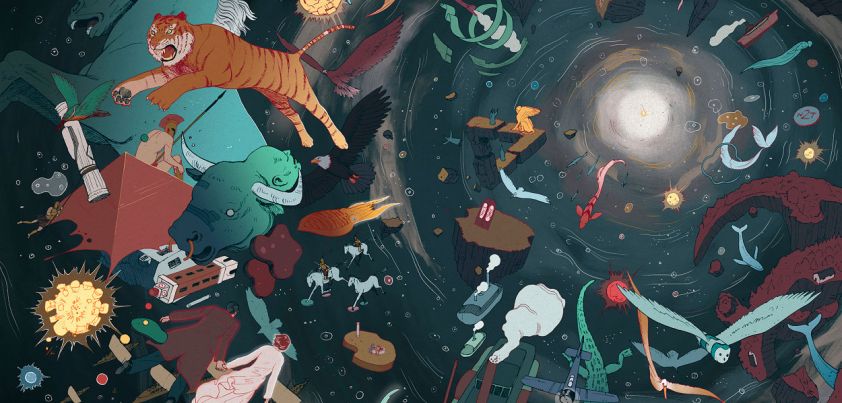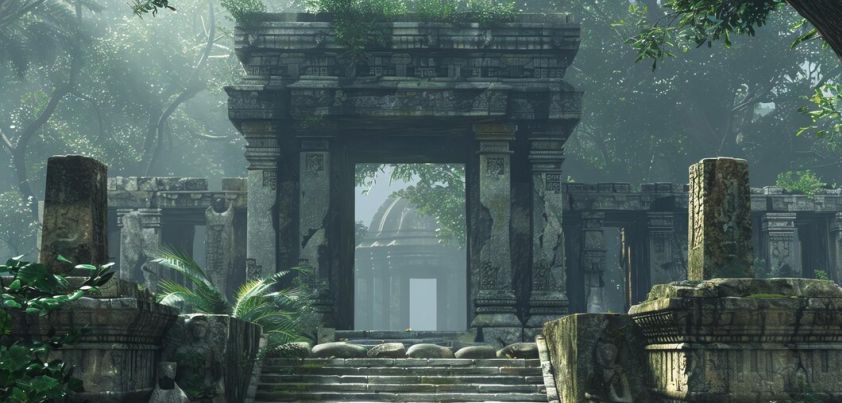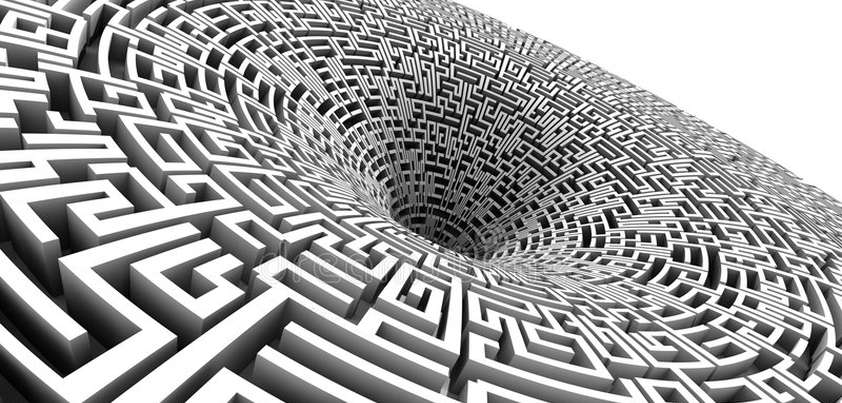 In a commentary on this story, Jorge Borges explained: “What eternity is to time, the Aleph is to space”. In the story, a fictionalized version of Borges maintains contact with the family of a deceased woman he once loved. He learns that her cousin, an “untalented” poet, is using an Aleph, a point in space that contains all other points, to write an epic poem versifying every place on Earth. Major Themes: the fleeting nature of memory, the limitations of language in describing infinity. Other themes: unrequited love, death, grief, the subjective nature of art. More…
In a commentary on this story, Jorge Borges explained: “What eternity is to time, the Aleph is to space”. In the story, a fictionalized version of Borges maintains contact with the family of a deceased woman he once loved. He learns that her cousin, an “untalented” poet, is using an Aleph, a point in space that contains all other points, to write an epic poem versifying every place on Earth. Major Themes: the fleeting nature of memory, the limitations of language in describing infinity. Other themes: unrequited love, death, grief, the subjective nature of art. More…
Archives
The Other
 In this story by Jorge Borges, a younger man sits beside an aging teacher sitting on a riverside bench. As they talk, the teacher realizes that the younger man is himself at an earlier age. An ‘impossible’ date on an American banknote convinces the skeptical young man this is true. The teacher concludes that while the meeting was real and he definitely took part in it, the younger man wasn’t really there… he was dreaming the encounter! This begs the question, Could it have been the other way around? Themes include human existence, time, memory, dreams, old age, relativism. More…
In this story by Jorge Borges, a younger man sits beside an aging teacher sitting on a riverside bench. As they talk, the teacher realizes that the younger man is himself at an earlier age. An ‘impossible’ date on an American banknote convinces the skeptical young man this is true. The teacher concludes that while the meeting was real and he definitely took part in it, the younger man wasn’t really there… he was dreaming the encounter! This begs the question, Could it have been the other way around? Themes include human existence, time, memory, dreams, old age, relativism. More…
The Book of Sand
 This story by Jorge Borges deals with one of the author’s common themes… the infinite. In this case, a book lover exchanges a rare edition of the bible for a book that can’t be understood. It is in a strange language and has an endless number of randomly changing pages. He becomes obsessed with discovering the book’s secrets and, when he fails, concludes that it is so “monstrous” that it should be hidden away somewhere it will never be found. Other themes include spirituality, the power of books, obsession (the need to understand), fear. More…
This story by Jorge Borges deals with one of the author’s common themes… the infinite. In this case, a book lover exchanges a rare edition of the bible for a book that can’t be understood. It is in a strange language and has an endless number of randomly changing pages. He becomes obsessed with discovering the book’s secrets and, when he fails, concludes that it is so “monstrous” that it should be hidden away somewhere it will never be found. Other themes include spirituality, the power of books, obsession (the need to understand), fear. More…
Circular Ruins
 In this story by Jorge Borges, a mystic arrives at the overgrown, burnt-out ruins of an ancient temple. Living as an ascetic, his purpose is to “dream” a man into existence, initiate him into the riddles of the universe, and send him to inhabit another temple. Before they part, he manipulates his creation’s memory so neither he nor anyone else will know he is a spirit. Later, on the point of death, the mystic learns that he, too, is the product of a dream. Themes include philosophical idealism, dreams vs. reality, the circle of life, creation, religion and spirituality. More…
In this story by Jorge Borges, a mystic arrives at the overgrown, burnt-out ruins of an ancient temple. Living as an ascetic, his purpose is to “dream” a man into existence, initiate him into the riddles of the universe, and send him to inhabit another temple. Before they part, he manipulates his creation’s memory so neither he nor anyone else will know he is a spirit. Later, on the point of death, the mystic learns that he, too, is the product of a dream. Themes include philosophical idealism, dreams vs. reality, the circle of life, creation, religion and spirituality. More…
The Garden of Forking Paths
 The themes of this story from Jorge Borges are order vs. disorder, time, and sacrifice. An ancient Chinese scholar gave up everything to write a book and create a labyrinth. No one could understand the book or find the labyrinth until a modern day sinologist solved the mystery. The book is the labyrinth; it argues that time is not linear, but a starting point for an infinite number of paths. A descendant of the scholar murders the sinologist. This has nothing to do with the book, but rather a cause he doesn’t believe in. More…
The themes of this story from Jorge Borges are order vs. disorder, time, and sacrifice. An ancient Chinese scholar gave up everything to write a book and create a labyrinth. No one could understand the book or find the labyrinth until a modern day sinologist solved the mystery. The book is the labyrinth; it argues that time is not linear, but a starting point for an infinite number of paths. A descendant of the scholar murders the sinologist. This has nothing to do with the book, but rather a cause he doesn’t believe in. More…
The Library of Babel
 Jorge Borges is known for his unusual and sometimes complex stories which connect things that don’t seem real or possible with the themes of metaphysics and religion. The Library of Babel also includes several other themes commonly found in Borges’s work: infinity, language and order vs. randomness. The Library, which is composed of a seemingly endless number of galleries, is an allegory for the universe. The books within the galleries are incomprehensible. The librarians, who represent mankind, search for the gallery of a mythical “Man of Books” (God?), thought to contain a compendium volume which may unlock the Library’s secrets. More…
Jorge Borges is known for his unusual and sometimes complex stories which connect things that don’t seem real or possible with the themes of metaphysics and religion. The Library of Babel also includes several other themes commonly found in Borges’s work: infinity, language and order vs. randomness. The Library, which is composed of a seemingly endless number of galleries, is an allegory for the universe. The books within the galleries are incomprehensible. The librarians, who represent mankind, search for the gallery of a mythical “Man of Books” (God?), thought to contain a compendium volume which may unlock the Library’s secrets. More…
The Disk
 Jorge Borges gives this story a timeless quality by setting it in medieval times and framing it like a fairy-tale. A traveler arrives at an isolated woodcutter’s hut claiming to be an exiled king descended from Odin, the Norse king of the gods. He supports this by showing the woodcutter what he claimss to be the disk of Odin, the only one-dimensional object in the universe. Ironically, the woodcutter answers: I do not worship Odin, I worship Christ… and then kills him to possess Odin’s disk. Theme: the desire to own something that holds power over the world around us. More…
Jorge Borges gives this story a timeless quality by setting it in medieval times and framing it like a fairy-tale. A traveler arrives at an isolated woodcutter’s hut claiming to be an exiled king descended from Odin, the Norse king of the gods. He supports this by showing the woodcutter what he claimss to be the disk of Odin, the only one-dimensional object in the universe. Ironically, the woodcutter answers: I do not worship Odin, I worship Christ… and then kills him to possess Odin’s disk. Theme: the desire to own something that holds power over the world around us. More…